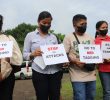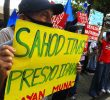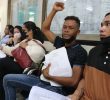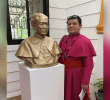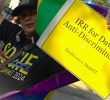John Sifton, HRW Asia advocacy director, has said “A no vote can be seen as an attempt to protect the Sri Lankan government from accountability for tens of thousands of deaths. This would be a slap in the face of human rights activists in Sri Lanka and elsewhere.”
By MARILOU AGUIRRE-TUBURAN
Davao Today
DAVAO CITY, Philippines – “Shame on the Aquino government.”
This was how human rights activist Carlos Conde reacted after the Philippines voted No to the United Nations (UN) Human Rights Council Resolution which seeks the Sri Lankan government’s accountability for its abuses.
By voting No, Conde said, the “Aquino government undermines efforts to improve human rights in the Philippines.”
In Geneva on Thursday, the UNHRC voted on the resolution that urges Sri Lanka to investigate the mass killings of civilians during the armed conflict between the government and the Liberation Tigers of Tamil Eelam (LTTE). The resolution was sponsored by the United States and co-sponsored by 41 countries.
The Human Rights Watch (HRW) has earlier asked the Aquino government to support the resolution and to vote Yes or to at least abstain.
John Sifton, HRW Asia advocacy director, has said “A no vote can be seen as an attempt to protect the Sri Lankan government from accountability for tens of thousands of deaths. This would be a slap in the face of human rights activists in Sri Lanka and elsewhere.”
Sifton noted that Filipinos “know all too well the costs of impunity.”
In the Philippines, rights group Karapatan documented a total of 137 victims of extrajudicial killings, 14 victims of desaparecidos (enforced disappearance) and 269 victims of illegal arrest and detention, among others. The record covered mid of 2010 to the end of 2012 or under the Aquino administration.
During the nine-year rule of former President Gloria Macapagal-Arroyo, Karapatan also documented 1,206 victims of EJKs, 206 desaparecidos and 2,059 victims of illegal arrests.
In Sri Lanka, 40,000 civilians died from war crimes allegedly committed by the Sri Lankan government during the 26-year armed conflict with the LTTE which ended in 2009.
The HRW has documented 75 cases of alleged rape, sexual abuses and torture committed by Sri Lankan security forces against suspected members or supporters of the LTTE from 2006 to 2012, or even after the conflict has ended.
Last year, at least five news websites were shut down by the Sri Lankan government for their contents critical to the administration. It has also implemented “onerous” registration requirements and fees for all web-based media services. A former editor of a newspaper, who published an article critical to Defense Secretary Gotabaya Rajapaksa, also reported of being threatened by him.
On February 19, HRW has urged the UNHRC to authorize an independent, international investigation into war crimes committed by the Sri Lankan government especially during the last months of the conflict.
It noted that since the UNHRC adopted the resolution calling for action in 2012, the “Sri Lankan government has taken no significant steps to provide justice for victims of abuse and accountability for those responsible.” In added that the army court the Sri Lankan government has set up to look into the allegations has released a report last February 15 which exonerated the army from any liability of civilian casualties.
The Sri Lankan government under President Mahinda Rajapaksa, the HRW said, has threatened activists who seek justice and made “small, cynical gestures to keep the international community at bay” instead of heeding the UNHRC resolution.
Sri Lanka Pres. Rajapaksa, according to HRW, has increased his control over the legislative and judicial branches of his government, thereby decreasing the democratic space. His government also eliminated the independence of the Supreme Court “by orchestrating the impeachment of the chief justice after she ruled a government-sponsored bill to be unconstitutional” in late 2012. “Rajapaksa quickly installed a political ally with a long record of rejecting accountability for conflict abuses as the new chief justice,” the HRW said.
Sifton said that with the Aquino administration’s No vote on the UNHRC Resolution, it would run “inconsistent” with the many improvements on human rights issues the HRW has observed under the current administration.
HRW noted the passage of the Responsible Parenthood and Reproductive Health Law, the Anti-Enforced or Involuntary Disappearance Act of 2012 and Kasambahay Law which institutes policies for the protection and welfare of domestic workers. However, it scored the passage of the Anti-Cybercrime Law and the government’s failure to hold security forces accountable for serious abuses like the killing of political and environmental activists.
Countries like Argentina, Costa Rica, Peru and Guatemala which experienced serious rights abuses before, Conde said, voted in favor to the UN resolution.
The UNHRC has approved the resolution with 25 countries voting for, 13 voting against and eight abstaining. Countries that voted yes include the European Union, Switzerland, Brazil, Sierra Leone, India and Korea; those that voted no include Pakistan, Venezuela, Sri Lanka and Thailand; and Japan is among those that abstained. (Marilou Aguirre-Tuburan/davaotoday.com)

